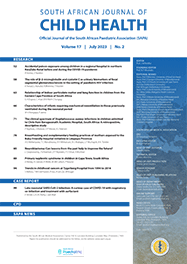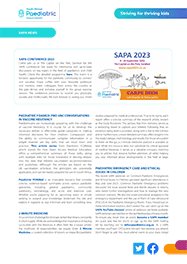Articles

Socio-clinical issues in cerebral palsy in Sagamu, Nigeria
Abstract
Objective: To determine the socio-clinical characteristics of children with cerebral palsy at Olabisi Onabanjo University Teaching Hospital, Sagamu, Nigeria.
Methods: Hospital records of 92 children attending the paediatric neurology clinic between the year 2000 and 2006 were retrospectively studied. Data extracted included the age and weight at the first clinic attendance, main diagnoses and number of clinic attendances. The parents were classified into upper (I, II and III) and lower (IV and V) socioeconomic classes.
Results: The prevalence of cerebral palsy among paediatric neurology clinic attendances was 50.3%. Most of the subjects (77.2%) were aged 1 to 3 years, were malnourished (80.4%) and belonged to the lower socioeconomic classes (70.6%). The clinical types of cerebral palsy were spastic in 80.4%, hypotonic in 12.0%, extrapyramidal in 4.3% and mixed types in 3.3%. Quadriplegia was also the commonest (66.2%) type of spastic cerebral palsy. Asphyxia (57.6%), kernicterus (36.9%) and CNS infections (21.7%) were the leading aetiologies identified in the subjects. Co-morbidities like seizures, microcephaly, speech and auditory deficits were present in 90.2% of the subjects. Seizures and microcephaly were commoner among cerebral palsy cases associated with asphyxia than those associated with kernicterus (p = 0.026 and 0.005 respectively). The rate of default from the clinic was very high at 80.4%.
Conclusion: Most cases of cerebral palsy in Sagamu, Nigeria were related to perinatal problems. Improved perinatal care may reduce the burden of cerebral palsy in the community. The high rate of default from follow-up clinic also needs to be addressed to improve the quality of care available to affected children.
Authors' affiliations
Tinuade Ogunlesi, Olabisi Onabanjo University Teaching Hospital, Sagamu, Nigeria
Mojisola Ogundeyi, Olabisi Onabanjo University Teaching Hospital
Folasade Adekanmbi, Olabisi Onabanjo University Teaching Hospital, Sagamu
Bolanle Fetuga, Olabisi Onabanjo University Teaching Hospital, Sagamu
Olusoga Ogunfowora, Olabisi Onabanjo University Teaching Hospital, Sagamu
Adebiyi Olowu, Olabisi Onabanjo University Teaching Hospital, Sagamu
Full Text
Keywords
Cite this article
Article History
Date published: 2008-10-30
Article Views
Full text views: 2075

.jpg)



Comments on this article
*Read our policy for posting comments here